Happy Tyrannicide Day (observed)
Happy Tyrannicide Day (observed)! To-day, March 15th, commemorates the assassination of two notorious tyrants. On the Ides of March in 2014 CE, we mark the 2,057 anniversary — give or take the relevant calendar adjustments — of the death of Gaius Julius Caesar, ruthless usurper, war-monger, slaver and military dictator, who rose to power in the midst of Rome’s most violent civil wars, who boasted of butchering and enslaving two million Gauls, who set fire to Alexandria, who battered and broke through every remaining restraint that Roman politics and civil society had against unilateral military and executive power. Driving his enemies before him in triumphs, having himself proclaimed Father of His Country, dictator perpetuo, censor, supreme pontiff, imperator, the King of Rome in all but name, taking unilateral command of all political power in Rome and having his images placed among the statues of the kings of old and even the gods themselves, he met his fate at the hands of a group of republican conspirators. Led by Marcus Junius Brutus and Gaius Cassius Longinus, calling themselves the Liberators
, on March 15, 44 BCE they surrounded Caesar and ended his reign of terror by stabbing him to death on the floor of the Senate.
By a coincidence of fate, March 13th, only two days before, also marks the anniversary (the 133rd this year) of the assassination of Alexander II Nikolaevitch Romanov, the self-styled Imperator, Caesar and Autocrat of All the Russias. A group of Narodnik conspirators, acting in self-defense against ongoing repression and violence that they faced at the hands of the autocratic state, put an end to the Czar’s reign by throwing grenades underneath his carriage on March 13th, 1881 CE, in an act of propaganda by the deed.
In honor of the coinciding events, the Ministry of Culture in this secessionist republic of one, together with fellow republics and federations of the free world, is happy to proclaim the 15th of March Tyrannicide Day (observed), a commemoration of the death of two tyrants at the hands of their enraged equals, people rising up to defend themselves even against the violence and oppression exercised by men wrapped in the bloody cloak of the State, with the sword of the Law and in the name of their fraudulent claims to higher authority. It’s a two-for-one historical holiday, kind of like President’s Day, except cooler: instead of another dull theo-nationalist hymn on the miraculous birth of two of the canonized saints of the United States federal government, we have instead one day on which we can honor the memory, and note the cultural celebrations, of men and women who defied tyrants’ arbitrary claims to an unchecked power that they had neither the wisdom, the virtue, nor the right to wield against their fellow creatures.
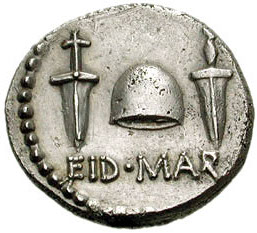
My favorite collectible coin. This silver denarius was actually minted and circulated in Macedonia by M. Junius Brutus after he and his fellow conspirators stabbed Caesar to death. The obverse features Brutus’s head in profile. The thing in the middle, above EID MAR (Ides of March) and flanked by the two daggers, is a Liberty Cap, traditionally given to emancipated slaves on the day of their freedom.
It is worth remembering in these days that the State has always tried to pass off attacks against its own commanding and military forces (Czars, Kings, soldiers in the field, etc.) as acts of terrorism.
That is, in fact, what almost every so-called act of terrorism
attributed to 19th century anarchists happened to be: direct attacks on the commanders of the State's repressive forces. The linguistic bait-and-switch is a way of trying to get moral sympathy on the cheap, in which the combat deaths of trained fighters and commanders are fraudulently passed off, by a professionalized armed faction sanctimoniously playing the victim, as if they were just so many innocent bystanders killed out of the blue. Tyrannicide Day is a day to expose this for the cynical lie that it is.
There are in fact lots of good reasons to set aside tyrannicide as a political tactic — after all, these two famous cases each ended a tyrant but not the tyrannical regime; Alexander II was replaced by the even more brutal Alexander III, and Julius Caesar was replaced by his former running-dogs, one of whom would emerge from the carnage that followed as Imperator Gaius Julius Son-of-God Caesar Octavianus Augustus, beginning the long Imperial nightmare in earnest. But it’s important to recognize that these are strategic failures, not moral ones; what should be celebrated on the Ides of March is not the tyrannicide as a strategy, but rather tyrannicide as a moral fact. Putting a diadem on your head and wrapping yourself in the blood-dyed robes of the State confers neither the virtue, the knowledge, nor the right to rule over anyone, anywhere, for even one second, any more than you had naked and alone. Tyranny is nothing more and nothing less than organized crime executed with a pompous sense of entitlement and a specious justification; the right to self-defense applies every bit as much against the person of some self-proclaimed sovereign
as it does against any other two-bit punk who might attack you on the street.
Every victory for human liberation in history — whether against the crowned heads of Europe, the cannibal-empires of modern Fascism and Bolshevism, or the age-old self-perpetuating oligarchies of race and sex — has had these moral insights at its core: the moral right to deal with the princes and potentates of the world as nothing more and nothing less than fellow human beings, to address them as such, to challenge them as such, and — if necessary — to resist them as such.
How did you celebrate Tyrannicide Day? (Personally, I toasted the event at home, watched the Season 1 finale of Rome, posted some special-occasion cultural artifacts to Facebook, and re-read Plutarch’s Life of Brutus from a nice little Loeb edition that I picked up from Jackson Street Books in Athens, Georgia.) And you? Done anything online or off for this festive season? Give a shout-out in the comments.
Thus always to tyrants. And many happy returns!
Beware the State. Celebrate the Ides of March!
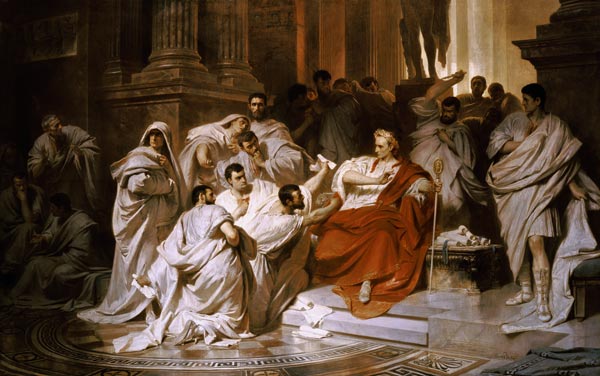
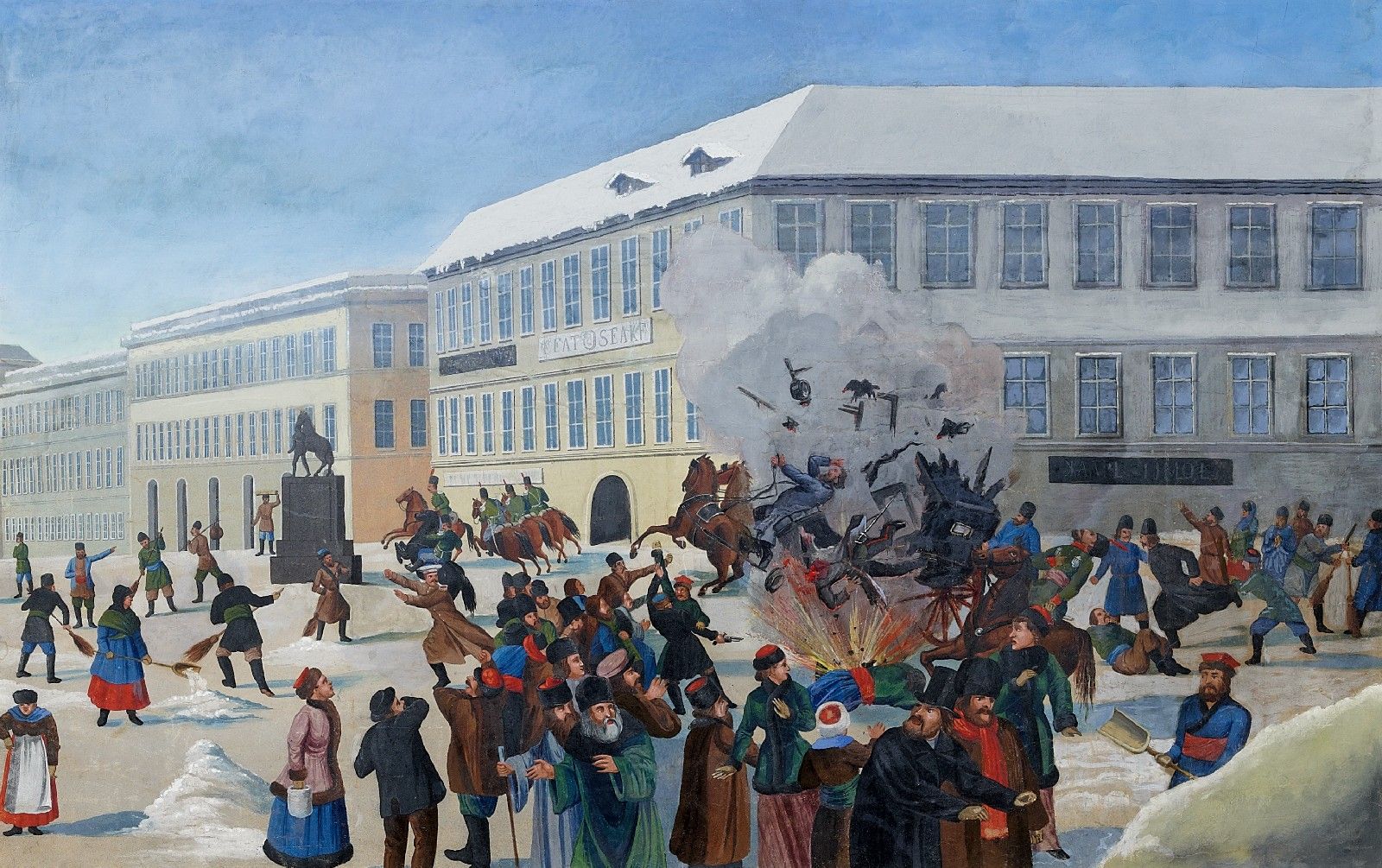


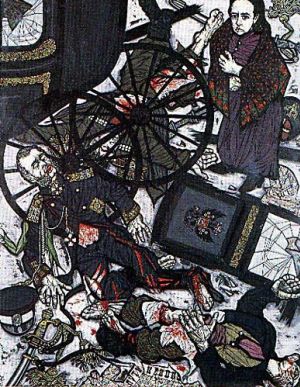
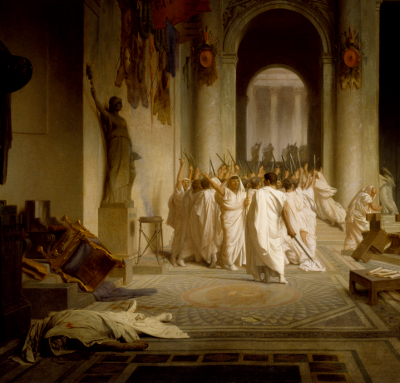

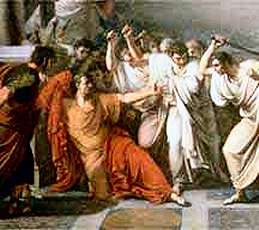 There are lots of reasons to avoid tyrannicide as a political tactic — after all, these two famous cases each ended a tyrant but not the tyrannical regime; Alexander II was replaced by the even more brutal
There are lots of reasons to avoid tyrannicide as a political tactic — after all, these two famous cases each ended a tyrant but not the tyrannical regime; Alexander II was replaced by the even more brutal  As a political strategy there are plenty of reasons not to get too enthusiastic about tyrannicide — after all, these two famous cases each ended a tyrant but not the tyrannical regime; Alexander II was replaced by the even more brutal
As a political strategy there are plenty of reasons not to get too enthusiastic about tyrannicide — after all, these two famous cases each ended a tyrant but not the tyrannical regime; Alexander II was replaced by the even more brutal